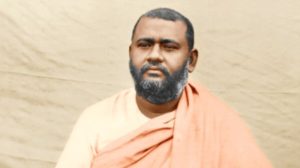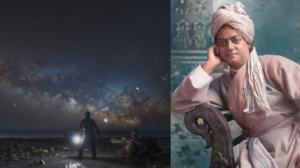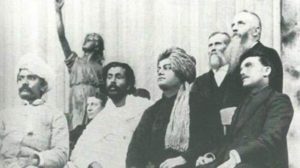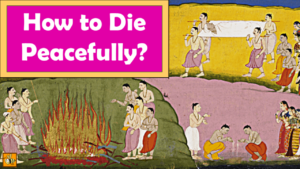The following incident took place in Madras in 1893, just before Swami Vivekananda set sail for his historic journey to America.
In those days Swamiji had taken the monastic vow of Agyatvas – during which, he, for a few years, had severed all contact with his family, friends and brother disciples (of his guru Sri Ramakrishna), and used to travel incognito, as a wandering monk all across India.
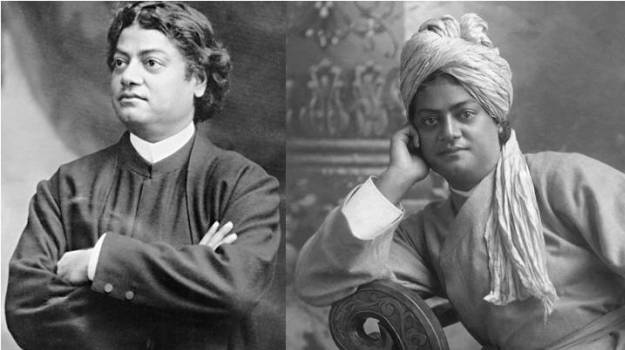
– Swami Vivekananda
As he travelled from place to place, people would often be so impressed with his regal bearing, knowledge and charisma, that they would invite him to their homes, to be their honoured guest.
At the time of occurrence of this incident, Swami Vivekananda was residing as the guest of Manmatha Babu, the Accountant General of Madras.
One day, as Sister Nivedita recounts in her book The Master as I Saw Him, certain souls who had committed suicide came to him. Now for a realized yogi like Swami Vivekananda, who had attained to Nirvikalpa Samadhi (complete union with God), this was nothing unusual. As Sister Nivedita writes, Swamiji “now and again, met and held converse with the spirits of the dead.”
But this time, these souls gave him the unfortunate news that his mother had passed. This perturbed Swamiji greatly because on account of his Agyatvas, he had not been maintaining any contact (via letters), with his family members in Calcutta and thus had no way of knowing of their well-being. At the same time in a few days he was to set sail for America, to attend the Parliament of Religions in Chicago.
Feeling quite unwilling to leave without determining the health of his mother, Swami Vivekananda managed to verify through some unusual means (which is the topic of a later story!) that his mother was actually quite alright.
Sister Nivedita now continues her account “Having ascertained by enquiry that his mother was well, he remonstrated with these souls for their untruthfulness, but was answered that they were now in such unrest and distress that the telling of truth or falsehood was indifferent to them.
They begged him to set them at peace, and he went out to the seashore at night, to perform a Shraddh (prayer ceremony) for them.
But when he came to that place, in the service, where offerings should be made, he had nothing to offer (being a penniless monk), and knew not what to do. Then he remembered an old book that said, in the absence of all other means of sacrifice, sand might be used, and taking up great handfuls of sand, he stood there on the shore casting it into the sea, and with his whole mind sending benediction to the dead.
And those souls had rest. They troubled him no more.”
Lessons We Can Learn
This beautiful story from the life of Swami Vivekananda highlights two important lessons for all of us.
-
Perils of Committing Suicide: The first lesson is regarding the dangers of suicide. At the time of death, our soul typically leaves the physical body, encased in a finer body, also known as the subtle body or Sukshma Sharir. This subtle body is the carrier for the mind. So after death, the mind accompanies us onto the other side. For more see this video: MIND Accompanies the Soul After Death.
When a person commits suicide, or dies in an act of violence, their minds become so disturbed during the process of death, that such people often have a difficult time determining whether they have actually died or not. On account of their agitated minds, they remain stuck in a sort of twilight zone – neither able to let go of their old life on earth, nor transition to a new life on the other side. Therefore it is very essential that one maintains a calm mind at the time of death.
-
Significance of Prayer Ceremonies for the Dead: It is for this reason that prayer ceremonies for the peaceful transition of the departed soul are a part of most major religions of the world. In Hinduism this is the Shraddh ceremony.
As Swami Abhedananda, another direct disciple of Sri Ramakrishna once explained: “We should pray for our departed friends and relatives (because) our prayers help release them from the earthbound conditions.” With the help of prayers, our loved ones can come to terms with their own deaths, let go of their past and transition to the next phase of their infinite existence. This is the second lesson to be learnt.
Now at this point, you might be wondering whether Swami Vivekananda was ever scared of ghosts. Here is his answer, given in a humorous exchange with a disciple:
“After Sri Ramakrishna’s leaving the body, I associated for some time with Pavhari Baba of Ghazipur. There was a garden not far distant from his ashrama where I lived. People used to say it was a haunted garden, but as you know, I am a sort of demon myself and have not much fear of ghosts.”
– Swami Vivekananda (Source: Complete Works, Volume 7)
Note: The above story from the life of Swami Vivekananda has been collated together from two sources: (1) The Master as I Saw Him by Sister Nivedita (Free Download!) and (2) The Complete Works of Swami Vivekananda Volume 6.
More Posts in the “Ghosts” Series:
- Part 2: Is Seeing Ghosts a Sign of Delusion? – Was Swami Vivekananda hallucinating talking to the spirits of those who had committed suicide? This post examines the answer.
- Part 3: Do Ghosts Exist? Swami Vivekananda Sheds More Light On This Mystery – A disciple once asked Swamiji – “Sir, these ghosts and departed spirits we hear about – are all these true or not? Have you ever seen ghosts?” Read Swami Vivekananda’s incredibly rational and powerful answer!
- Part 4: The Ghost Tamer Whom Swami Vivekananda Transformed With a Mere Touch – Swami Vivekananda transforms a man with occult powers over ghosts, into a spiritual person with a tremendous desire to see God.
- Part 5: The Mysterious Pelting of Stones Which Disturbed Swami Brahmananda – Two incidents from the life of Swami Brahmananda, in which a distressed spirit and a luminous saint employ some unusual means to catch his attention.
- VIDEO: 5 Reasons Why Some People Become Ghosts After Death – How do we avoid getting trapped as a ghost after death? Thought-provoking lessons from the Rishis of Vedanta, who detail the correct manner in which we must live life, so as to avoid the “preta yoni” or the ghost state after death.
- VIDEO: Help! I’m Scared of Ghosts | Top 10 Questions About Ghosts Answered – Scared of ghosts? Afraid spirits lurking in the dark will hurt you? Overcome your fear of ghosts through a rational understanding of life after death.
- VIDEO: Reincarnation | MIND Accompanies the Soul After Death – It is a little known fact that the mind accompanies the soul after death. It is only because of this fact that it is possible for people to remember their past lives.

